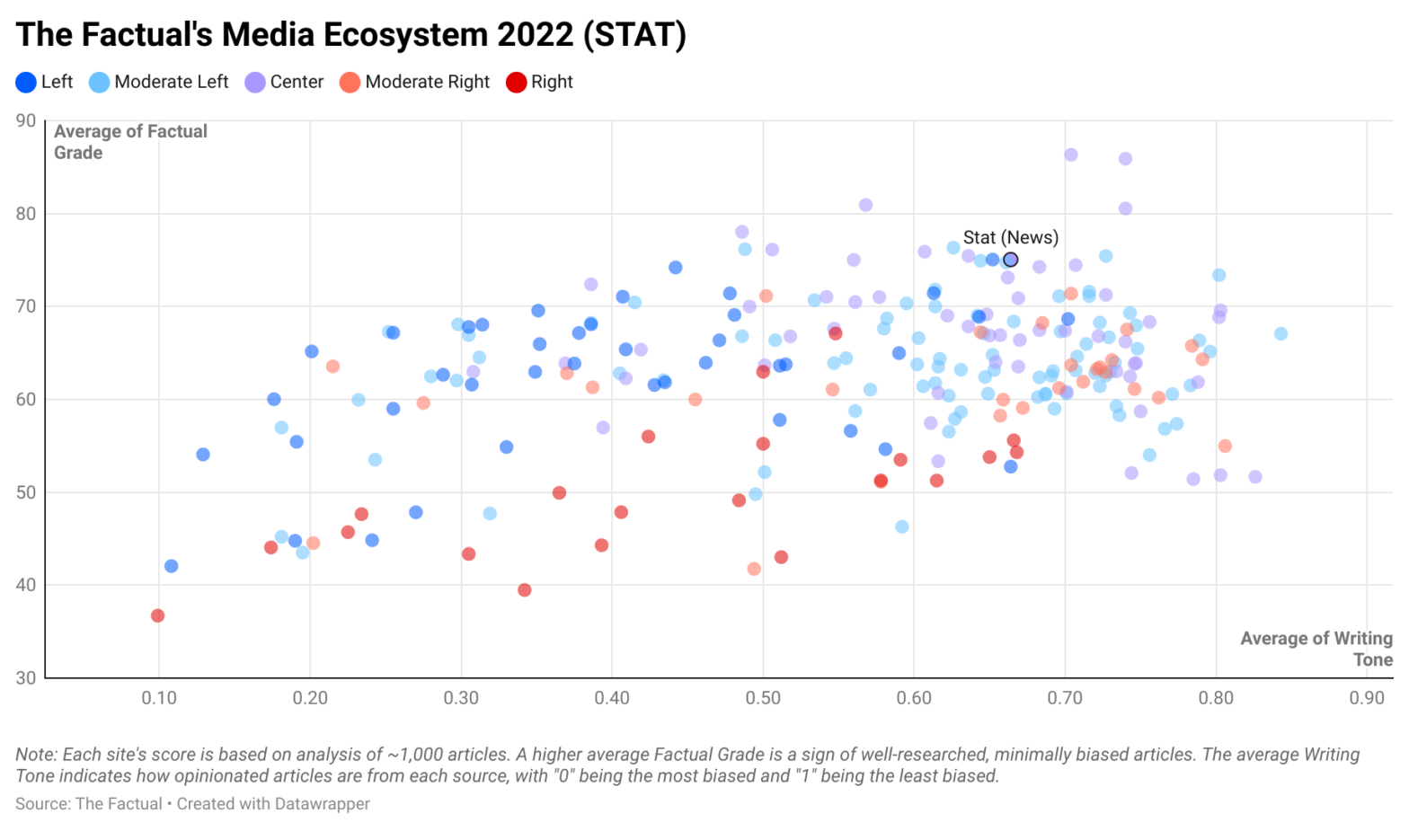STAT was founded in 2015 by John Henry, owner of the Boston Red Sox and the Boston Globe, as a publication focused on the life sciences. Today, the site aims to cast “a critical eye on scientific discoveries, scrutinize corporate strategies, and chronicle roiling battles for talent, money, and market share” from “inside academic labs, biotech boardrooms, and political backrooms.” It has capitalized on that role during the Covid-19 pandemic: it published its first article on the virus on January 4, 2020, well before most other major publishers, and saw traffic explode as a result. So, how reliable is STAT and how biased is its reporting?
How Does The Factual Rate News Sources?
The Factual analyzes more than 10,000 news stories every day to help readers find the most informative, least-biased articles. Our news-rating algorithm scores each article along four metrics: (1) cited sources and quotes, (2) publication history, (3) writing tone, and (4) author expertise. These scores combine in a weighted average we call a Factual Grade, which ranges from 0–100%. (See our How It Works page to learn more about our algorithm.)
For this study, we analyzed ~1,000 articles each from 240 news sources. The average Factual Grade for the entire dataset was 62.5%. Based on these averages, we can compare the performance of news sites across the media ecosystem. The entire dataset can be explored in greater detail here.
How Factual Is STAT?
STAT scored an average Factual Grade of 75.1%, placing it in the 95th percentile of our dataset. This places the site among the top 15 highest-scoring publications that we analyzed.
Several factors help explain STAT’s high performance along these metrics. Perhaps most importantly, STAT features a heavy focus on scientific information and adequately sourcing information. That means articles typically include direct quotes as well as links to other high-quality sources. Likewise, STAT benefits from having experienced journalists who routinely cover the same topics in health and science. The Factual’s algorithm rewards such topical expertise, as it shows that the author is familiar with a topic and is likely to bring beneficial knowledge and context to their reporting.
Like any news source, scores for articles from STAT vary widely based on factors like author expertise and cited evidence. For example, some scored above 90%, while others scored below 60%.
Please check your email for instructions to ensure that the newsletter arrives in your inbox tomorrow.
How Opinionated Is STAT?
One of the metrics The Factual uses is the Writing Tone, which measures how opinionated the writing is in an article. For this metric, the algorithm looks for signs of subjective commentary (e.g., first person pronouns and unnecessary adverbs), as well as the emotional nature of selected words, and sees how prevalent they are for a given length of text. More neutral text receives higher ratings, with “0” being the most opinionated and “1” being the most neutral.
STAT had an average Writing Tone score of 0.66, placing it in the 64th percentile in our dataset for this metric. This suggests that articles from the site exhibit a moderate amount of opinionated language. This can be seen in a spectrum of headlines, from highly neutral (“Supreme Court says intent matters in prosecuting doctors in opioid cases”) to somewhat opinionated (“Democrats will have to limit their drug pricing reforms to Medicare”).
What Is STAT’s Political Bias?
The Factual classifies news sites by political bias as either Left, Moderate Left, Center, Moderate Right, or Right. This classification comes from third-party assessments from media bias organizations such as AllSides and Media Bias/Fact Check (MBFC). Based on this data, The Factual assigns STAT a Center bias.
MBFC rates STAT as “Left-Center” due to “editorial positions that moderately favor the left on political health and medical issues.” Additionally, they give STAT credit for highly factual reporting and note that the site has not failed any fact checks. In terms of bias, MBFC highlights that STAT is prone to producing articles that are critical of the Trump administration (“Trump officials actively lobbied to deny states money for vaccine rollout last fall”) while coverage of the Biden administration can be more favorable (“Biden is set to block dozens of Trump’s last-minute health regulations”).
AllSides rates STAT as “Center” based on independent research and 104 community ratings. AllSides has yet to complete a typical, in-depth review of STAT, so they assign a low confidence rating to this classification.
Please check your email for instructions to ensure that the newsletter arrives in your inbox tomorrow.
Who Owns STAT?
STAT was launched by John Henry in November 2015. In addition to the Boston Red Sox, Henry also owns Boston Globe Media, which is responsible for STAT. STAT’s website asserts that they are separate from the Boston Globe, though material may be shared or complement one another. Henry declared in 2015 that his rationale for starting the site was the vibrant life sciences scene in Boston and Cambridge that was “not being covered by a serious, standalone news organization.” It is unclear how, if at all, Henry’s ownership may influence the political bias of STAT, but it is worth noting that the Boston Globe is typically classified as Moderate Left.
Why Does It Matter?
News articles always have some bias because all authors have some frame of reference within which they describe a story. Political bias ratings are helpful in understanding this framing. However, it can be more beneficial to know how factual an article is based on quantifiable metrics that can be seen across the media ecosystem, such as cited evidence, author expertise, and writing tone. This is what The Factual ascertains.
Reading several, highly rated articles from across the political spectrum helps counter the bias of any news source or story. To have the day’s most factual news stories delivered to your inbox every morning, subscribe to our daily newsletter.
Article updated on September 22, 2022 to reflect new data.

